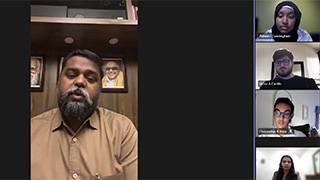Cyberbullying in Indian Higher Education
Monday, July 3, 2023

Senthil Kumar, M.D. talking with research students about the issue of cyberbullying in higher education.
Dr. Senthil Kumar, M.D., senator and member of India’s parliament for the Dharmapuri Parliamentary Constituency, recently met with research students virtually for an enlightening talk with Seton Hall’s undergraduate research students from the Department of Mathematics and Computer Science about the crucial issue of cyberbullying against students in universities. The senator, known for his extensive work in social empowerment and policymaking, provided valuable insights into the changing landscape of women's empowerment in India, particularly within the college and university settings.
Dr. Kumar was invited to dialogue with students as part of the Department’s student-led research project, “Cyberbullying Against Women Students in Universities with Analytical Insights,” which focuses on identifying the personality traits of different students and how social media usage plays a role in cyberbullying behaviors against women students in the university as well as how it impacts student's well-being both inside and outside the university This is a proactive research project that was initiated based on growing concern among women students. Part of the cybersecurity lab setup, the project has been in progress for the last four months.
Joining the students virtually, Dr. Kumar spoke on the remarkable progress India, specifically in the state of Tamil Nadu, has made in fostering women's empowerment over the past few years. He emphasized the significant growth observed in various areas, including initiatives such as microcredit and political quotas, which have played a pivotal role in transforming the lives of women and girls in the region.
During his speech, Dr. Kumar vividly depicted the state of women's empowerment in India a few years ago, highlighting the challenges and barriers they faced. He explained the crucial steps and policies implemented to bring about such a tremendous change in the country. These efforts have opened new doors of opportunities for women and contributed to society's overall progress and development.
However, the senator also shed light on a pressing issue that has emerged alongside these positive developments – cyberbullying against university students. Dr. Kumar underlined the importance of addressing this issue promptly and effectively, as it poses a threat to the well-being and mental health of students. He discussed the various forms of cyberbullying and shared strategies and measures that can be adopted by educational institutions, policymakers, and individuals to combat this pervasive problem.
The talk was met with great enthusiasm and engagement from the research students who actively participated in the ensuing discussion. Dr. Kumar's expertise and insights gave the students a deeper understanding of the complexities surrounding cyberbullying and highlighted the urgent need for concerted efforts to create safe and inclusive learning environments for all students.
The event served as a platform for knowledge sharing, fostering dialogue and inspiring future research and policy initiatives aimed at tackling cyberbullying in universities. Dr. Kumar's talk was appreciated by participants for its relevance, timeliness and valuable insights into the evolving landscape of women's empowerment and the challenges faced by students in the digital age.
As the issue of cyberbullying continues to gain attention globally, it is imperative for educational institutions, policymakers, and society as a whole to address it comprehensively, ensuring the well-being and security of all students. Dr. Kumar's talk contributed to this ongoing conversation, empowering the next generation of researchers to find innovative solutions and create a safer environment for students in universities across India.
Categories: Department of Mathematics and Computer Science






